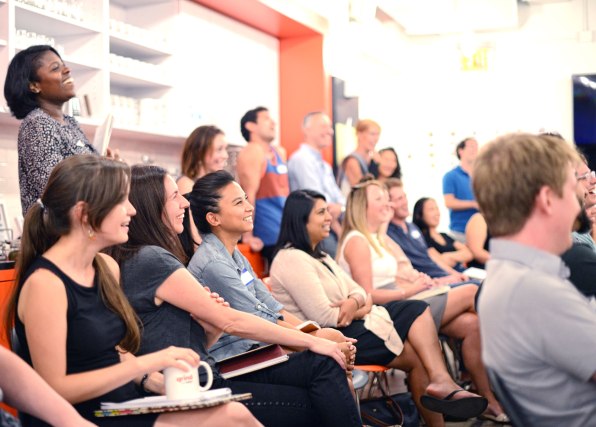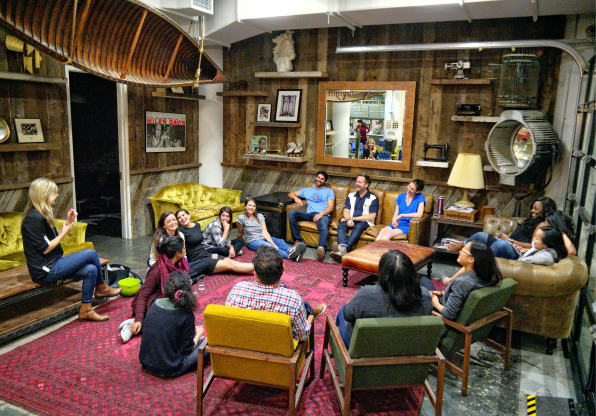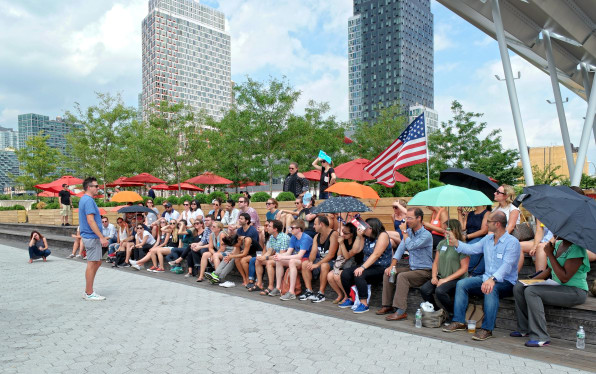Would You Pay $1,500 For A More Meaningful Career?
Twelve years ago, the Verizon Building was a hub of the Downtown Manhattan area, an industrial pylon leering out across the East River. Today it stands largely empty. The telecom giant vacated the premises in 2007, making room for the 40 or so people now huddled around small tables in a back room of the second floor.
It’s a weeknight in late April, and they’re all here to figure out how to leave jobs at big corporations. This is the ninth week of a 12-week career-change program by a London-based startup called “Escape the City”—its first one in New York—and just about everyone in the room (there’s a $250 early-bird discount) has paid $1,500 to try and do just that.

The Allure Of Something Better
The “escapees,” mostly professionals in their 20s and 30s, include the standard New York City mix of lawyers, consultants, and designers. You might expect a career- and life-coaching program to attract tired commuters with deeply hunched postures and glazed eyes, but this one hasn’t. There’s a focused and eager atmosphere in the room, a buzz of excitement for coming to grips with the unfamiliar.
And for this crowd, what counts as unfamiliar is a career that feels purpose-driven and meaningful, on terms that aren’t set by a corporate mission statement. That’s what the organization’s cofounders, Dominick Jackman and Rob Symington, felt was lacking from their own jobs as London management consultants back in 2010.
“I was sleepwalking through my career” Jackman recalls, before realizing it was a sentiment many of his peers also shared. What soon became “Escape the City” (a reference to the name of London’s financial district, the City of London) began as a small, informal meet-up for weary corporate types. Word spread among friends, and then to strangers, who were looking for someplace to vent about the lack of meaning in their work.
In the years since, Escape (members often truncate its name in conversation) has expanded these group therapy sessions into a full slate of offerings, which also include weekend courses and an assortment of one-off talks by guest speakers. The 12-week program, though, is Escape’s flagship service and emphasizes business-building, emotional intelligence, and self-discovery.
But for those looking to leave corporate lifestyles but who are unsure what to do next, Escape the City’s more measured approach might feel like the safer bet.

Finding Something Meaningful, Often For The First Time
Leading tonight’s session is Olivia Frazao, a wiry, short-haired clinical psychologist who at the moment sounds more like a business coach.
She’s frenetically bouncing around the room, discussing escapees’ final projects as “minimal viable products,” or “MVPs,” one of the many elements of Escape’s program that nods to Silicon Valley culture. In this case, an MVP is any concrete step an escapee can take toward creating a testable, career-shifting idea. Examples projected on a wall include “start a regular outdoor meet-up” and “find freelance design projects,” and they sound more like personal or professional goals than like products or services to build a business around.
Frazao isn’t fazed by this, though; in fact, these objectives have taken weeks to arrive at, first through exercises meant to deconstruct societal norms around careers, then with bite-sized solo activities, like reaching out to potential business mentors or even just starting conversations with strangers. Simple as they sound, these are opportunities almost every participant admits to having skirted in the past.
Frazao’s task now is to help escapees come up with ways to test their MVPs quickly. In one case, that’s going from being a weekend artist to actually setting up an Etsy shop. In another, it’s organizing a retreat with friends to see whether being a digital nomad and working as a tour guide feels like the right career move. Participants write down their MVP activities and begin honing the idea.
After 20 minutes or so of discussion, Frazao, circling the room, senses her audience is losing focus. “How’s everyone feel about this?” she asks. A bunch of hands spring up giving a sideways thumb, and she launches into a new exercise: “Say the one thing that defines you as different,” Frazao exclaims. Nobody is spared; everyone is compelled to define themselves. Down the line the escapees stand up and volunteer their answers.
“I am thoughtful” one says, and another chimes in, ” I am witty . . . just, uh, not right now.”
The whole session moves fluidly like this, eschewing structure for short bursts of energetic activity that compel everyone to stay alert and involved. Escapees have all experienced the claustrophobic work of cubicles or overcrowded open office plans, but few have experience in team environments that really put them on their toes this way—let alone on matters involving their own ambitions.

Can You Put A Price On Career Happiness?
But should an opportunity for self-discovery really cost four figures? Does it really take three months of intensive weekly coaching to decide to launch an Etsy shop? To be fair, Escape the City offers other, cheaper resources, like the popular free newsletter at the heart of its member network, which boasts some 250,000 subscribers. For many, the answer is a clear yes; in fact, some have already left the 12-week program early with success in hand.
One of them, Nehal Shukla, a former Credit Suisse consultant, settled on a new career path after just four weeks. When we spoke by phone, she described the pressure of growing up as a first-generation immigrant with her family back in the Democratic Republic of Congo. When she signed up for Escape, she’d recently been laid off, and an early session in the program was transformative. Through writing exercises, Shukla was coached to reflect on some of the things her culture, parents, and friends had projected onto her—how the foundation of her career had formed. She’d never really examined where her own ambitions actually came from, what values they reflected, and whether they were actually her values.
As Shukla described the experience later, “It’s about breaking away from a mold of responsibility parents put on us,” a sentiment echoed by many of the escapees I meet. More than a few are first- and second-generation immigrants like Shukla, who also described feeling trapped by the expectation that they’d eagerly embrace the American ideal through corporate ladder-climbing. Just a few weeks into the program, Shukla received simultaneous offers from Ashoka Africa, a social innovation nonprofit, for a role as a financial manager in Kenya, and from Goldman Sachs as a financial analyst. She chose the former and has since moved back to Africa, crediting Escape for giving her the perspective to accept the passion project.
Escape is careful not to guarantee any single, specific outcome from its programming. Instructors describe their goal as ranging from helping participants find “alignment” by squaring their inner goals with their existing lives to discovering an “aha” moment in the midst of an emotional breakdown brought on by work stress. At times it seems that Escape’s mission—like its clients’ careers—is still something of a work in progress.
But perhaps that’s not a bad thing. Toward the end of the night, an investment banker I’ll call Alex (he asked to remain anonymous), is slouched in his chair at the back of the room. “It’s more like AA [Alcoholics Anonymous] for your career,” he tells me when I ask how he’d characterize the program—a way of helping workaholics finally put together an exit strategy. Landing a new job thanks to Escape would be a coup de grace, he says, but the real value is just gaining enough clarity of purpose to contemplate a change in the first place. When I hear from Alex a few weeks later, he says he’s in the early stages of new entrepreneurial effort, but for now he’s hanging onto his comfortable salary.
The night ends as Farao separates the escapees into smaller “accountability groups” where four to five people recount their achievements of the past week. For most, that doesn’t include settling on new job titles, but for many that lingering uncertainty is okay. They’ve made it through the difficult part, forcing uncomfortable questions to the surface. Now they’re simply left to figure out an escape route.
Garreth Dottin is an experienced engineer and a writer who covers multiculturalism and the changing nature of work. You can find more of his work at Habits and Design.
For many young professionals, sometimes just getting the chance to think through a career change is as valuable as actually pulling one off.
Twelve years ago, the Verizon Building was a hub of the Downtown Manhattan area, an industrial pylon leering out across the East River. Today it stands largely empty. The telecom giant vacated the premises in 2007, making room for the 40 or so people now huddled around small tables in a back room of the second floor.
Fast Company , Read Full Story
(12)














